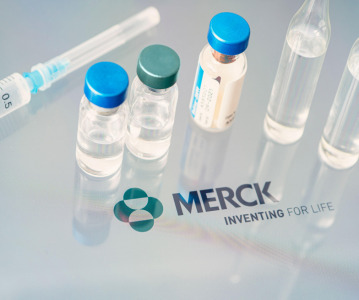Merck tests new formulation of Keytruda before the patent runs out
.png)
Merck tests new formulation of effective immunotherapy Keytruda to gain approval in time to extend the patent on the drug before it runs out in 2028.
The immunotherapy drug Keytruda is effective in increasing the 5-year survival rate in various cancers, now Merck are working on a form of the drug that can be delivered subcutaneously, before their current patent expires.
In the coming years, many patents for our most well-known drugs and treatments will be reaching their expiration dates, this is posing a challenge to many pharmaceutical giants who have had the monopoly on their established treatments. Merck is one such company, where their cancer immunotherapy treatment Keytruda, which was approved in 2014, has key patents that are due to expire in 2028.
However, Merck has overcome this challenge to effectively protect their rights over the $20 billion immunotherapy by proposing to patent a new formulation, which can be injected under the skin.
Keytruda uses the body’s immune system to fight cancer. It is currently administered via a slow injection into the vein. The drug is used against a variety of cancers, either in combination or as a single therapy. Used as a single drug it has been shown to help patients live longer than treatment with just chemotherapy in some cancers such as advanced non–small cell lung cancer.
Once the patent on Keytruda has expired, this will authorize other drug companies to develop biosimilars, close versions of biologics that are cultivated inside living cells.
Merck has been working on two new formulations of the drug that can be injected subcutaneously, a much faster method than the current intravenous infusions, which are being tested in clinical trials. If the formulations perform well in the clinical trials, Merck could begin to produce and market the drug in the near future, hoping to continue Keytruda’s growth trajectory with the gaining of approvals in earlier stage cancers.
"We believe that subcutaneous formulation has the potential to be novel, non-obvious and useful, which means we would get a new patent for it," stated Caroline Litchfield, Merck CFO, outlining the criteria under US law to determine what technologies merit a patent.
"The clock for that patent would start ticking from the time we would get that patent approved."
The new formulation would initially be used to replace the single use intravenous therapy of Keytruda, and the combinations therapies, such as in conjunction with chemotherapy would continue to use the original formulation.
"In theory it could replace everywhere that Keytruda currently is used," Merck Chief Medical Officer, Eliav Barr explained.
In the USA, drug patents guarantee exclusive use for 20 years, sometimes companies can extend this by adding multiple patents to one product. By adding a patent for a subcutaneous form of Keytruda, Merck could extend the patent protecting its exclusive use until 2040.
"It's the way the pharmaceutical companies now use that system -- it's all about taking up as much space as possible, making it difficult for anybody to enter," explained Tahir Amin, co-founder of drug patents watchdog group Initiative for Medicines, Access & Knowledge (I-MAK). "Keytruda is going to be the next Humira by all accounts."
Merck would most likely apply for new patents covering developments in the drug’s formulation, dosing regime, how its used and it’s potential for combinations with other drugs.
"These patent applications, if granted, may provide varying degrees of protection beyond 2028. However, we would continue to point to late 2028 as the most likely timeframe for biosimilar entry into the market," Merck said in a statement.
Merck emphasised that the new formulation would have numerous benefits for patients, increasing patient compliance and quality of life by having a subcutaneous administration that was fast, as opposed to spending long periods in hospital receiving a transfusion. By ensuring continuity of care by keeping patients on Keytruda with their normal schedule, their cancer treatment would not be interrupted.
"From a quality of life and patient perspective, it's for sure going to be helpful," Barr concluded.
Related News
-
News Merck invests US$1 billion in new USA-based vaccine facility
Merck annouces the opening of a new state-of-the-art vaccine production plant in Durham, North Carolina, USA, in efforts to bring pharmaceutical product development onto home soil in face of new import tariffs. -
News US FDA adds haemodialysis bloodlines to devices shortage list
On March 14, 2025, the US FDA published an open letter to healthcare providers citing continuing supply disruptions of haemodialysis bloodlines, an essential component of dialysis machines. -
News Women in Pharma: Manufacturing personal and team success
Our monthly Women in Pharma series highlights the influential lives and works of impactful women working across the pharmaceutical industry, and how the industry can work towards making the healthcare industry and workplace more equitable and inclusive... -
News The next 15 drugs up for negotiation with Medicare include several blockbusters
By now, everyone is quite familiar with the drug price negotiations taking place between drug companies and the Centres for Medicare & Medicaid Services (CMS) in the USA as part of measures being taken to reduce the cost of drugs for patients, to make ... -
News Pfizer may shift production back to US under Trump pharma tariffs
At the 45th TD Cowen annual healthcare conference in Boston, USA, Pfizer CEO Albert Bourla outlined the potential for Pfizer to shift its overseas drug manufacturing back to the US as pharmaceutical industry players weigh their options against Presiden... -
News Experimental drug for managing aortic valve stenosis shows promise
The new small molecule drug ataciguat is garnering attention for its potential to manage aortic valve stenosis, which may prevent the need for surgery and significantly improve patient experience. -
News Trump's federal funding shift could stifle biotech innovation
Over a month into the second term of Donald Trump’s presidency and we have already seen some big changes affecting the healthcare industry. -
News Sanofi receives FDA warning over contamination at manufacturing site
The FDA issues a warning letter to Sanofi over contamination violations found at the Framingham biologics facility, in Boston, MA, USA.
Position your company at the heart of the global Pharma industry with a CPHI Online membership
-
Your products and solutions visible to thousands of visitors within the largest Pharma marketplace
-
Generate high-quality, engaged leads for your business, all year round
-
Promote your business as the industry’s thought-leader by hosting your reports, brochures and videos within your profile
-
Your company’s profile boosted at all participating CPHI events
-
An easy-to-use platform with a detailed dashboard showing your leads and performance








